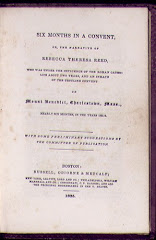Search terms:
~Six Months in a Convent
~Escaped nuns tales
~Nuns
~Rebecca Reed
~Convents
~Anti-Catholicism
Preliminary Bibliography:
Cohen, Daniel A. “The Respectability of Rebecca Reed: Genteel Womanhood and Sectarian Conflict in Antebellum America.” Journal of the Early Republic, Vol. 16, No. 3 (Autumn, 1996), pp. 419-461. 9 February 2009. www.jstor.org.
Cohen takes a chronological and historical look at Reed’s SMIC Narrative. He looks at the social climate of the times, Reed’s family background, and examines multiple accounts of her admission into the Convent.
Griffin, Susan M. “Awful Disclosures: Women’s Evidence in the Escaped Nun’s Tale.” PMLA, Vol. 111,
No. 1, Special Topic: The Status of Evidence (Jan., 1996), pp. 93-107. 9 February 2009. www.jstor.org.
Griffin explores the “escaped nun” tale as a genre. She notes the commonalities of narration themes: torture, murder, rape, and etc. She also posits that the genre is related to the gothic, that the structures of the fictional and nonfictional accounts all have claims toward the truth, complete with footnotes and other references designed to make the reader believe in the truth and accuracy of the claims. Further, she looks at the women themselves, and the social ramifications of coming forward with their tales.
Fessenden, Tracy. “The Convent, the Brothel, and the Protestant Woman’s Sphere.” Signs, Vol. 25,
No. 2 (Winter, 2000), pp. 451-478. 9 February 2009. www.jstor.org.
The article explores the interconnection of the convent, brothel, and Protestant women. She makes the point that convents made people nervous because they were so private. Prostitutes had an all-too-public image, whereas no one really knew what the nuns got up to in their cloisters. Both groups of women endured the same mistrust and antagonism by the Protestants, overshadowed by the enormity of Rome and their moral imperatives. Still, Fessenden remarks that nuns had an almost feminist influence: they were able teachers, could support themselves, and defied social mores by taking the veil rather than husbands and families.
McCauley, Bernadette. “Their Lives Are Little Known: Nuns and American Reform.” Prospects, Vol.
29 (2004), pp. 219-229.
Not entirely sure if this is something that will be useful, but I have ordered it through Interlibrary Loan. Its description states that the article is about nuns’ influence on American social reform in the nineteenth and twentieth centuries, including reform and educational reforms. Also discussed is the issue that nuns operate outside of normal female parameters.
Food for Thought:
I rather liked digging up articles that had a social/historical standpoint. I’ve never been one to believe entirely in the text itself—and frankly, as soon as someone tells me that they are a good person, I tend to get suspicious. In any case, this was fun. It is sort of like detective work—I get to essentially run a background check on the author, look at the case that was built against her, and pick it all apart. Good fun.
Maybe I missed my calling.
In any case, I am not sure exactly where I want to take my research project, yet. I still feel as though I am in the info-gathering stage. I still have to read the novel in its entirety, but that shouldn’t take long as it is a quick read, and in large print. Then I have to read it all over again. As I research other articles and whatnot, a second reading will help me to look for any more interesting dirt to dig in and ideas to pick at.
Subscribe to:
Post Comments (Atom)


No comments:
Post a Comment